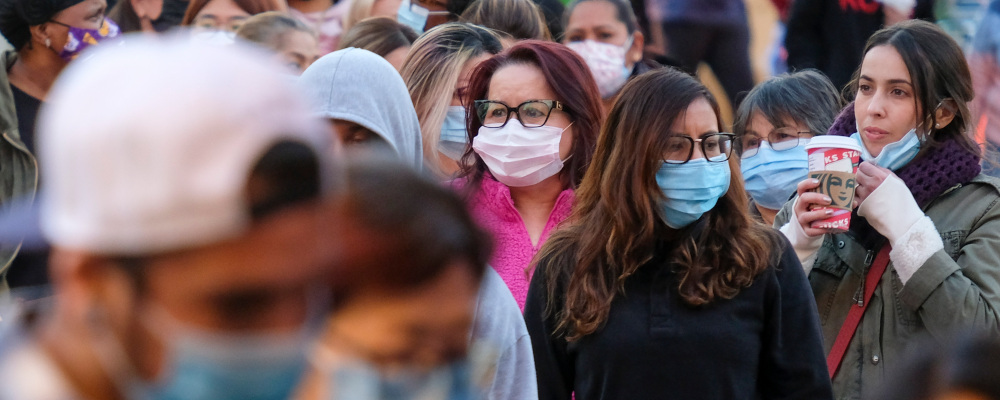After two years of fear and restrictions, will COVID-19 soon transition from being a dangerous pandemic to an endemic disease that remains present but manageable? Our initial naive belief was that we could accomplish an endemic state by achieving herd immunity with 70 percent of the population fully vaccinated or previously infected. As the virus mutated with an alphabet soup of Greek letters, Alpha and Delta showed us the challenges of dealing with an ever-changing virus whose evolving strains were able to be more transmissible, more deadly, and resistant to vaccination.
Delta was heartbreaking because we knew boosters restored 90 percent protection from infection and that hospitalization and ICU care were primarily and needlessly the risks of the unvaccinated.
Just as we thought the Delta wave was ending and possibly the pandemic with it, along came Omicron and the incredible initial spike in cases in South Africa which then quickly dominated worldwide. Initially, the world panicked as we faced a variant much more contagious than any other and which easily infected those with only two vaccine doses. Even boosters were only about 50 percent protective from becoming infected. Infection was suddenly easily spread by the vaccinated even if asymptomatic.
While health care was again challenged, cases weren’t as severe. Far fewer infected people needed hospitalization and their duration of stay was less. Rates of respiratory disease and intubation were much lower. Triple vaccinated people who were not immune suppressed rarely ended up in an ICU or died. The 95-year-old triple vaccinated Queen of England contracted Omicron and only suffered a cold.
Was Omicron less deadly because so many people were vaccinated or was it also importantly a far less dangerous strain than Delta? An Ontario study published February 17, 2022, as a research letter in JAMA informed us. The authors matched two groups each of just over 9,000 patients seen in a five-week period from November 22 to December 24, 2021. One group had been infected by Delta and the other by Omicron. Omicron cases were much milder than Delta with about one-tenth the mortality and one-fifth the hospitalization rate. Patients with at least two vaccine shots had one-tenth the risk of the unvaccinated regardless of the variant causing infection. Disease burden for Omicron remained much lower even if not vaccinated. Thus Omicron was inherently a much milder strain than Delta regardless of vaccination status. Vaccines remained essential to preventing severe illness regardless of viral mutation causing infection.
We are now seeing a sharp decline in cases, the reopening of non-urgent care, and the proposed removal of vaccine and mask mandates by many countries, including in parts of Canada. The pandemic isn’t over but the high surge and now rapid decline in cases caused by a much less dangerous variant has led us to declaring COVID-19 soon to be an endemic rather than pandemic state.
As restrictions are rapidly eased, the risk has not completely gone away but soon will be highly manageable if we are prepared and thoughtful about containing the residual risk.
Will vaccine boosters still be needed?
It is highly likely that voluntary annual boosters will be offered to those most at risk, namely those over 50 or those with co-morbidities or immune suppression. Those who decline will accept their increased risk and our health care system needs to be prepared to deal with their illness. The approval of the non-mRNA Novavax vaccine may be more appealing to the vaccine hesitant who may be afraid of more modern but less tested technology.
Will new more dangerous strains emerge?
As long as a residual worldwide pool of unvaccinated people remains, new mutations may develop that again threaten us more than Omicron. For the next six months or so the risk is much lower since such a large percentage of the world’s population is either vaccinated or has survived less severe Omicron illness.
A milder Omicron virus has thus hastened our journey from pandemic to a more manageable endemic disease. This state of greater normalcy won’t be accomplished by further demonizing the unvaccinated, but rather by an acceptance of certain risks and mitigating them effectively.
How must Canada Prepare?
The last two years have led to a post-traumatic fear that, even if vaccinated, we might become seriously ill or die. Accepting the lifting of restrictions, while highly welcome, is threatening to many who have lived with the fear of disability or death for so long that they have difficulty overcoming the psychological trauma caused by this pandemic.
Travel is safely resuming. We need to remain vigilant in recognizing the arrival of new strains by continuing to genotype the virus and track where outbreaks of new variants may arise. This will not be achieved by wasting $1.2 billion on routine testing of incoming travellers, but rather targeted testing of travellers if new variants emerge. We need to direct these and substantial additional funds to urgently bolster health care.
Upgrading health care
We currently have inadequate numbers of hospital and ICU beds. This was shown only too clearly by the stress of the pandemic. In addition, there continue to be high levels of burnout and depression felt by front-line health care workers traumatized by the stress of dangerous work with inadequate relief and compensation. We need to train and hire more nurses and physicians to staff the expansion of services needed. We should have started this two years ago.
Managing new disease outbreaks
There may be another wave of infection and we have to deal with it without further lockdowns. New antiviral drugs are highly effective and need to be stockpiled and used for those at high risk. Drugs such as fluvoxamine need to be considered and used based on quality scientific data, either available or solicited. We need to protect the vulnerable better with free access to high-grade masks and rapid deployment of additional vaccines if needed. Permanent improvements to ventilation and safeguards for congregate facilities need to be mandated.
Canada is at an important crossroad. We can either continue to live in fear and focus on measures that look good politically, or we can plan and spend thoughtfully, thus preserving our freedoms. The choice is ours to make and for our governments to understand and follow.
Recommended for You

Alberta is the only province where the population grew in third quarter of 2025: Statistics Canada

Here’s how Canadian oil and gas can fuel global emissions reductions

Canadian young men now earn less income than 65-plus men on average for first time: Report

Health-care wait times in Canada hit 28.6 weeks median in 2025 as Ontario has lowest waits: Study




Comments (0)